Understanding Rat Problems in Gardens
Picture this: you step into your garden expecting tranquillity, but instead, you spot a rat darting across your flower beds. Suddenly, the peace is gone. Rats in your garden aren’t just a trouble-they’re a growing threat that demands quick action, especially since rats visiting can turn into a bigger issue fast.
Whether it’s the risk of disease or damage to your plants, knowing how to get rid of rats is crucial. Therefore, in this guide, we’ll dive into why rats are attracted, how to spot them early, and the best ways to keep rodents out naturally – without harming pets or wildlife.
By the end, you’ll have clear, actionable steps to build a rat-free garden that lasts, including information on how to get rid of rats in your garden naturally.
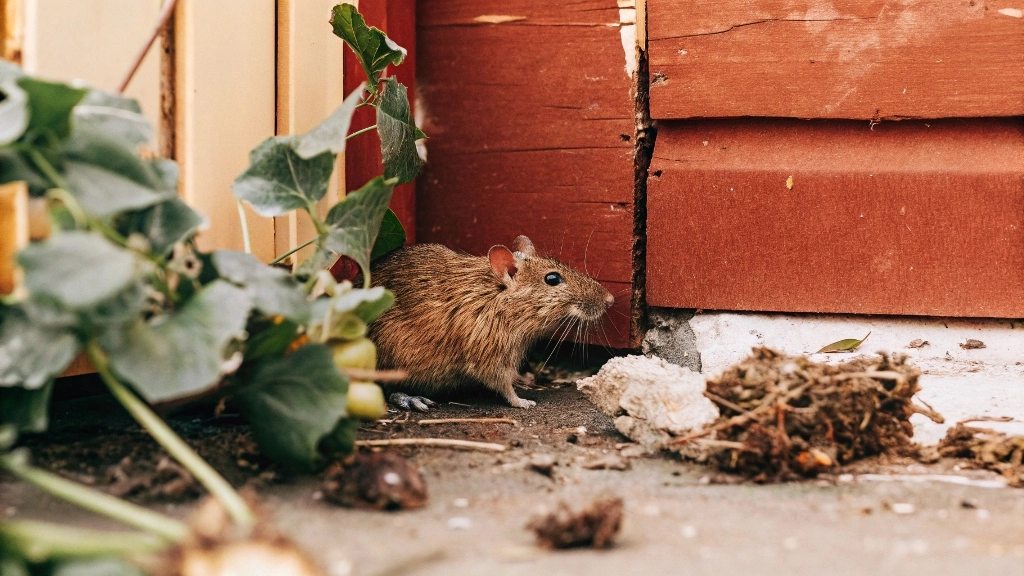
Why You Need to Get Rid of Rats from Your Garden Fast
The Dangers of a Rat Infestation
First off, rats carry serious risks. For instance, a single brown rat can spread diseases like leptospirosis, threatening your family and pets. Additionally, rodents chew through wires, plants, and even garden furniture, leaving costly damage behind. If ignored, a rat infestation can explode, making it difficult to get rid of them later. According to recent RSPCA statistics, garden rat populations across the UK have increased by 25% in the past five years, with Midlands areas particularly affected.
Why Rats in Your Garden Are a Bigger Problem Than You Think
Rats are mostly nocturnal, so spotting one often means more are nearby. To get rid of rats without killing them, block entry points, repel rats naturally, and keep your garden tidy. If signs of rats in garden persist, a professional pest controller can help stop rats and keep them away for good.
What makes garden rats particularly problematic is their ability to:
- Reproduce every 4-5 weeks (source: Rentokil)
- Burrow extensively, compromising garden structures
- Transition from outdoor spaces into homes and outbuildings
- Displace beneficial wildlife through competition and aggression
Common Garden Pests vs. Rodents
For example, slugs damage leaves, but rodents like mice and rats target food and structures. Rats eat vegetables, raid bins, and burrow under sheds, while pests stick to plants. Consequently, this makes rat control a top priority over standard pest management.
| Pest Type | Primary Targets | Reproduction Rate | Disease Risk | Property Damage |
| Slugs/Snails | Plant foliage | Moderate | Low | Minimal |
| Insects | Specific plants | Varies | Low-Medium | Limited |
| Rodents | Food, structures, plants | Very high | High | Extensive |
Early Warning Signs of Rats in the Garden
Important Indications of Rats in Compost, Garden Beds, or Pathways
Early detection is crucial for effective rat control. Watch for these telltale indicators:
- Cylindrical droppings (1-2cm long) near compost, decking, or pathways
- Gnaw marks on wood, plastic containers, or garden furniture
- Distinctive burrow entrances (6-9cm diameter) along fences or structures
- Smudge marks along walls from body oils (also called “rat runs”)
- Disturbed bird feed or scattered seed hulls beneath feeders
How to Spot a Rat’s Nest in the Garden
Garden rat nests typically appear in:
- Dense vegetation or untrimmed hedgerows
- Spaces beneath decking or garden buildings
- Compost heaps providing warmth and nesting material
- Cluttered areas with accumulated debris
- Rockeries or stone features with convenient gaps
Look for collections of shredded paper, fabric, or plant material-signs that rats have created a nesting site. According to British pest control experts, most garden nests contain 6-12 rats during peak breeding seasons.
Is It a Rat or Other Garden Pest?
Not sure if you’re dealing with rats or other garden visitors? Here’s how to identify rodents accurately:
- Rat droppings: Larger (½-¾ inch) with blunt ends
- Mouse droppings: Smaller (¼ inch) with pointed ends
- Squirrel evidence: Includes partially eaten nuts and bulbs
- Vole signs: Smaller runways through grass, not along structures
Brown rats leave greasy smudge marks along paths they frequently travel, while mice typically don’t. Additionally, rat burrows feature compacted soil entrances, unlike the looser entrances of beneficial garden creatures like frogs or toads.
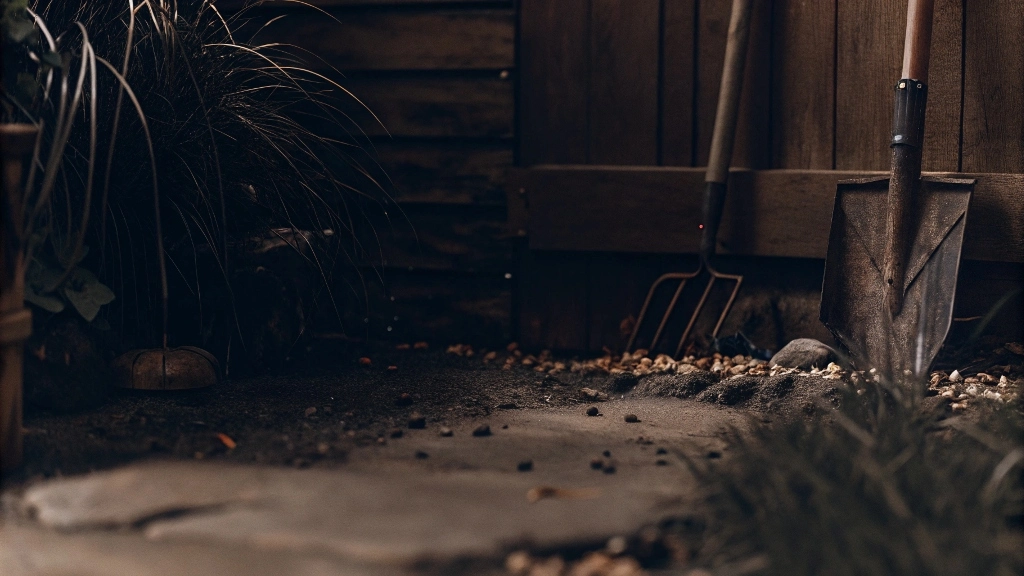
Why Rats Are Attracted to Your Garden
Top Food Sources Attracting Rodents
Rats need food, and your garden might be a feast. Fallen fruit, pet food, and overflowing bins attract rodents like magnets. Therefore, cutting off these sources is step one to stop them from seeing your garden as a place for them. Research from UK garden centres shows that gardens with accessible food sources are 80% more likely to develop rat problems than those with secure storage practices.
Bird Feeders, Open Compost, Pet Food
Bird feeders spill seeds, tempting vermin to linger around your garden. To deter rodents while supporting birds:
- Use rat-proof bird feeders with catch trays to minimize spillage
- Place feeders at least 1.5m above ground and away from structures
- Implement pole baffles to prevent climbing
- Consider evening feeder removal when rat activity is highest
- Clean spilled seed daily, particularly before nightfall
Untidy Spaces, Sheds, and Garden Buildings
Cluttered sheds or untidy spots provide shelter. Although brown rats are known for adaptability, they prefer hidden nooks to nest. Thus, clearing debris and sealing gaps keeps rodents at bay, preventing them from settling in.
Best Ways to Get Rid of Rats in the Garden (Without Poison)
Effective Natural Methods for Eliminating Rats
Want to act fast? Start by removing food-secure bins and sweeping up spills. Then, block entry points to sheds with mesh. These natural steps repel rodents without chemicals, offering a safe solution.
DIY Rat Control Strategies That Work
For example, snap traps with peanut butter work wonders, while live traps offer humane removal. Place them near droppings or feeders for success. Consistency here is key to controlling vermin yourself, so stick with it.
How to Eliminate Rats Without Risking Pets or Wildlife
Poison risks pets, so opt for safer options instead. Motion-activated sprinklers or ultrasonic devices keep vermin away without harm. This way, you protect wildlife in your garden too, ensuring a balanced approach.
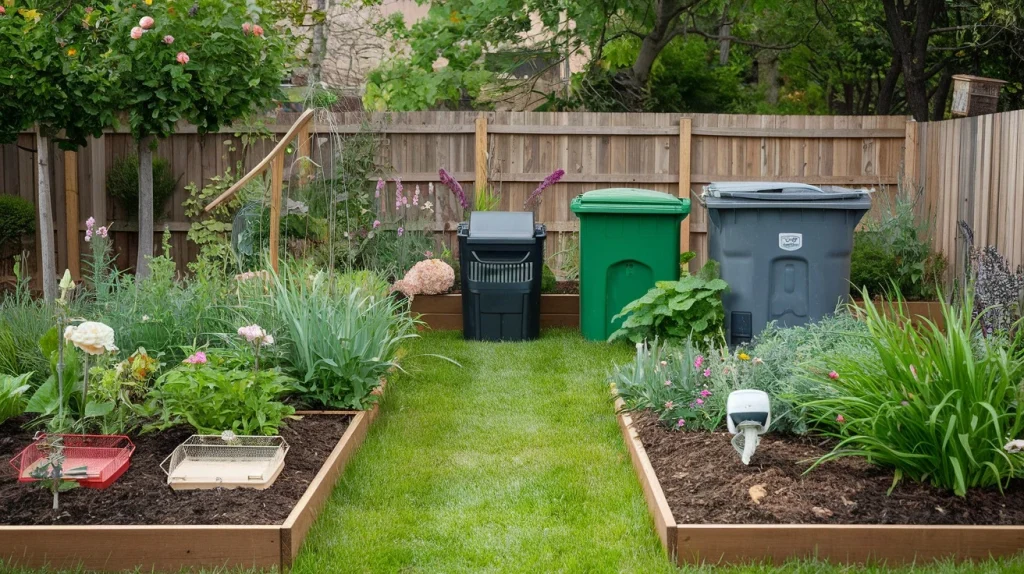
How to Remove Rats from Your Home Without Killing Them
Ethical and Humane Rat Deterrent Methods
If killing rodents isn’t your goal, use live traps to catch and release them far away. Pair this with barriers like wire around compost bins for ways to prevent or get rid of rodents humanely.
- Live capture traps: Choose RSPCA-approved models with adequate ventilation and space
- Catch-and-release practice: Transport captured rats at least 2-3 miles from your garden to prevent return
- Exclusion techniques: Install one-way doors that allow them to exit but not re-enter structures
- Habitat modification: Create open spaces between vegetation to increase predator visibility
European research shows that combined deterrent approaches achieve 85% better results than single methods when addressing how to get rid of rats in the garden without harming them.
Building a Garden Without Risk to Animals
Strategic garden planning can significantly reduce rat attractiveness:
- Maintain 30cm clear spaces around structures and dense plantings
- Elevate compost systems with secure wire mesh underneath
- Install rat-proof mesh beneath raised beds and decking
- Create predator-friendly environments with owl boxes or perches
- Use gravel pathways instead of mulch where possible
- Position bird feeders thoughtfully with clean zones underneath
Non-Lethal Traps and Control Rats the Safe Way
When using live traps as part of your strategy to get rid of rodents naturally:
- Pre-baiting: Place unset traps with bait for 2-3 days to reduce trap shyness
- Optimal placement: Position traps along walls, behind objects, or in corners
- Weather considerations: Shield traps from extreme conditions to prevent stress
- Frequent monitoring: Check traps at minimum morning and evening
- Humane handling: Transport captured rats in the covered trap to release sites
- Release habitat selection: Choose locations with water, cover, and natural food sources
Although rats seem small, they’re a serious hygiene risk-rats can make you sick, and they also spread bacteria. The British Pest Control Association advises gloves and handwashing, especially if rodents have entered or you’re handling traps. To get rid of the them and rat-proof your space, remove feeders in your garden, block entry points, and look for signs of rat infestation like burrows or a rat’s nest in the garden.
Natural Remedies to Deter Rats from Your Garden
Strong Smells That Rats Hate
Rats often avoid strong odours like peppermint oil, which can help keep rodents away and deter rodents naturally. Additionally, chilli powder or garlic sprays also deter rats and are an effective way to get rid of rodents without poison or traps, since they do not like these scents.
Use of Peppermint Oil, Chili, and Natural Sprays
If rats are visiting your garden, it’s important to take quick action. Mixing peppermint oil with water and spraying it around bins is a great way to get rid of rodents quickly.
- Peppermint Spray: Mix 15 drops of peppermint oil with 2 cups of water; spray bins every 3 days.
- Garlic Spray: Steep crushed garlic in water and mist veggie rows weekly. (compounds persist even after rainfall.)
- Predator urine: (commercial products containing fox or stoat scent)
- Citronella oil: (dual-purpose as insect and rodent deterrent)
Additionally, scattering chilli flakes near plants creates a natural barrier to deter rodents, effectively keeping them away from your garden. This method helps to get rid of rodents naturally and safely, without harming pets or wildlife.
How to Keep Rats from Your Garden Naturally
Plant mint or lavender to repel vermin. Meanwhile, regular cleanup removes hiding spots. Together, these organic tricks maintain a rat-free space effortlessly.
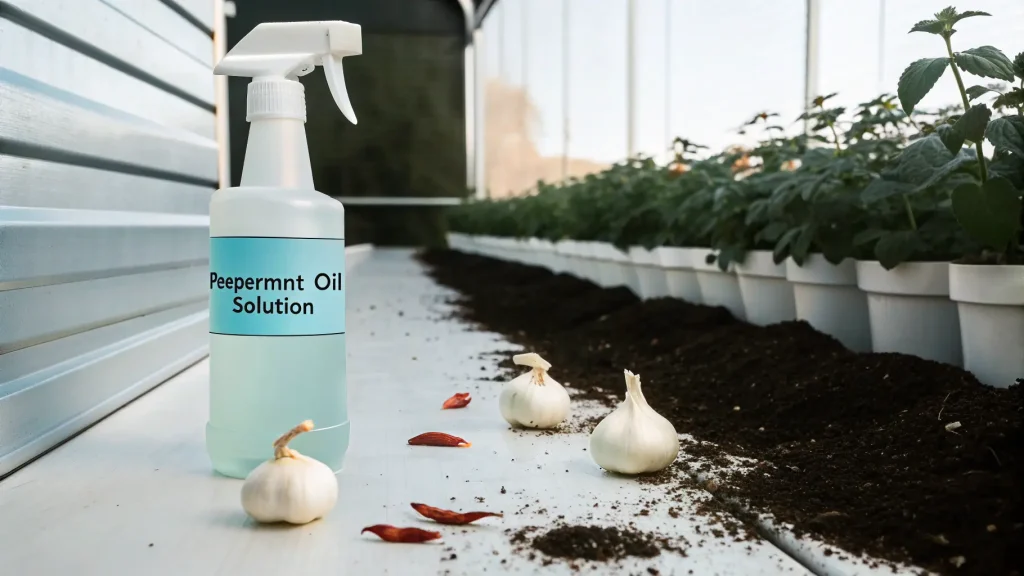
Products That Help: Top-Rated Rat Control Tools
Best Outdoor Rat Traps (Live & Snap Options)
Snap traps are quick and cheap, while live traps suit humane goals. Set them near compost or feeders-rats often visit these spots, so placement matters. When selecting humane capture equipment, consider these top-rated options:
| Trap Type | Capture Capacity | Weather Resistance | Ease of Use | Approx. Cost (£) |
| Multi-catch | 5-15 rats | High | Moderate | £35-60 |
| Single-catch Wire | 1 rat | Medium | High | £15-25 |
| Transparent Plastic | 1-2 rats | Low | Very High | £10-20 |
| Trip-plate Design | 1 rat | High | Moderate | £20-30 |
Review of Ultrasonic Repellents and Bait Boxes
Ultrasonic devices emit sounds brown rats hate but humans don’t hear. Ultrasonic devices operate at 22-65 kHz (inaudible to humans but disturbing to rodents). Bait boxes with non-toxic bait offer another safe choice. Both help you know how many rodents you’re dealing with, giving you control.
Choosing Rat-Proof Bird Feeders and Compost Containers
To get rid of rats quickly, use sealed bins and feeders in your garden to keep rats away since they love easy food sources. If rats don’t leave, they may set up home beneath decking and cause an infestation of rats – rats can make a mess by chewing on wires and furniture. Knowing how many rats and which rat species you’re dealing with helps you stop rats and prevent them from returning.
How to Prevent Rats from Returning to Your Garden
How to Maintain a Clean Garden to Prevent Reinfestation
A tidy garden is essential in discouraging rodents, as rats may be drawn to clutter. By regularly clearing debris, trimming plants, and securing bins, you can prevent rodents from entering and setting up home beneath decking, reducing the chances of an infestation of rats.
Additionally, using products from a garden centre can help rat-proof your space, since they prefer areas with easy access to food, and rats can also leave damage behind by chewing on structures or wires, which makes killing them unnecessary if proper prevention is in place.
Securing Sheds, Sealing Bins, and Removing Clutter
To prevent rats from entering your garden, seal shed gaps with steel wool and use tight bin lids to block potential entry points, as rats prefer hidden spaces. Additionally, removing clutter eliminates a place for rats to nest, helping to get rid of vermin in the long run. This also prevents rats from chewing on structures and keeps your garden safe from future rat problems.
Landscaping Tips to Deter Rats from Your Garden Long Term
Open layouts are more effective than dense bushes, as they often seek shelter in thick vegetation. Gravel paths and raised beds make burrowing difficult, helping to keep vermin away and discourage rodents from entering your garden over time.
According to British garden experts, consistent maintenance reduces rat recurrence by over 90% compared to one-time interventions.
When to Contact a Qualified Pest Control Company
Signs It’s Time for Professional Rodent Control
Despite best efforts, some situations require expert help. Consider professional assistance when:
- Multiple rats are visible during daylight (indicating severe infestation)
- DIY methods show no improvement after 2-3 weeks
- Rat activity extends to multiple garden zones or neighboring properties
- Evidence suggests rats have accessed home interiors or critical structures
- Health vulnerabilities exist within your household
- Legal restrictions affect control options in your area
What to Expect from Pest Control Services
When selecting professional help, look for companies specialising in humane pest control:
Service Components:
- Comprehensive site assessment identifying all entry points and attractions
- Custom control plan emphasizing non-lethal methods where possible
- Structured approach beginning with exclusion and habitat modification
- Clear timelines and follow-up protocols
- Detailed prevention recommendations for long-term protection
Qualifications to Verify:
- BPCA (British Pest Control Association) membership
- Natural England wildlife management licensing
- Specific training in humane control methods
- Public liability insurance
Is It Ever Okay to Use Rat Poison?
Poison works but risks wildlife. Save it for severe situations that are supervised by professionals. If not, use natural remedies, which are frequently equally successful. The Wildlife and Countryside Act 1981 and Animal Welfare Act 2006 provide legal frameworks governing rat control methods in the UK, making professional guidance valuable for compliance.
John’s Rat-Free Retreat with Midlands Gardening Expertise
Meet John, a Nottingham homeowner who wanted to reclaim his backyard from pesky rodents nibbling his veggies. He called Midlands Gardening and Cleaning, and, as always, we delivered with skill and careful attention, creating a rat-free haven.
Starting with a thorough cleanup of overgrown weeds and clutter, our team seamlessly planted mint and lavender to repel rodents naturally. We then installed sturdy, rat-proof bins and sealed shed gaps, boosting both safety and charm.
Throughout, our precision stood out-every plant was perfectly positioned, and the area was left spotless after the job. In the end, John’s revitalised retreat offered peace, free of rodents, with a lush look that enhanced his home’s appeal.
Unsurprisingly, John’s experience was top-notch, and he now heartily recommends Midlands Gardening and Cleaning to anyone seeking expert, eco-friendly solutions for a thriving, pest-free space.
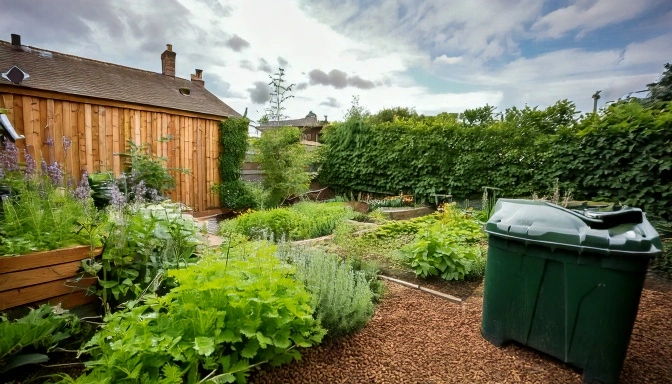
11. Frequently Asked Questions
Can you get rid of rats without poison?
Yes, absolutely! You can use live traps, peppermint sprays, or ultrasonic repellents to keep them away safely. For example, sealing bins and removing food sources also works wonders without chemicals. Environmental management (removing food, water, and shelter) combined with physical barriers and deterrents resolves 85-90% of garden rat problems without chemical interventions.
How do you spot a rat nest in your yard?
Look for burrows near sheds, compost, or dense plants. Shredded materials like paper or leaves inside are a giveaway. Additionally, rodents leave droppings around, so look for those indicators as well.
Will rats eat my vegetables or garden plants?
Yes, rats show distinct preferences for certain garden crops, particularly:
- Root vegetables (potatoes, carrots, beets)
- Corn and grains (especially as they ripen)
- Fruit crops (strawberries, fallen tree fruits)
- Squash and pumpkins
- Bulbs and tubers
Protection strategies depend on crop type:
- For root crops: Use buried wire mesh beneath raised beds
- For fruit: Harvest promptly and implement daily clean-up
- For vegetables: Consider netted enclosures during peak rodent seasons
Can I control rats on my own?
In many cases, yes! DIY methods like traps and natural deterrents work well for small problems. However, if rats keep returning or you spot signs around your garden, a professional might offer faster relief.
12. Your Rat-Free Oasis Awaits with Midlands Gardening Magic
We’ve reached the end of our rat-banishing journey – your pest-free yard is in sight. Throughout this guide, we’ve covered spotting rats early, why they invade your space, and how to get rid of rodents naturally.
From scents that deter rodents to sealing compost bins, you’re set to oust rodents for good. Ultimately, these steps create a safe, thriving haven, free of rats’ nests and damage.
Therefore, let’s finish strong – contact Midlands Gardening and Cleaning today for a free consultation. With our expertise, your serene, rat-free oasis is just a call away!

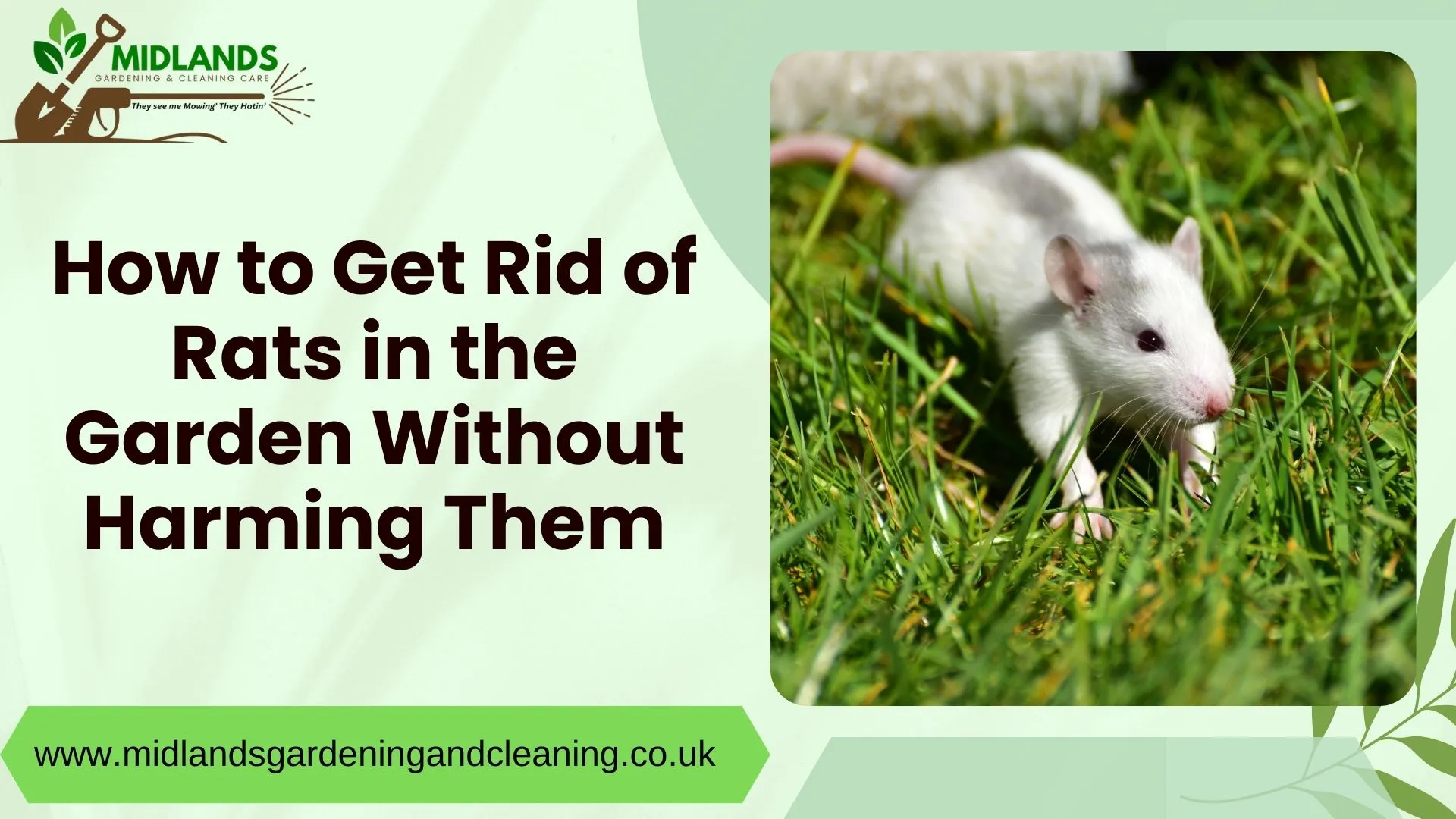
0 Comments